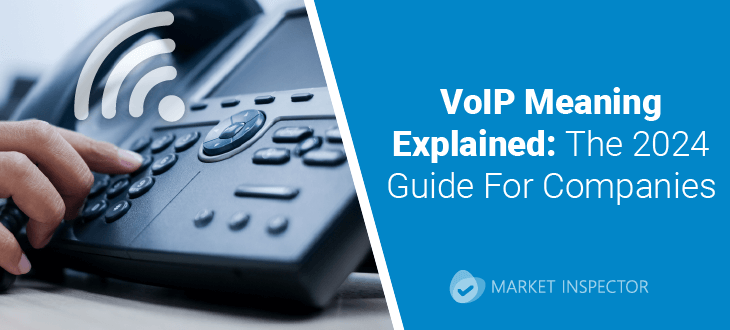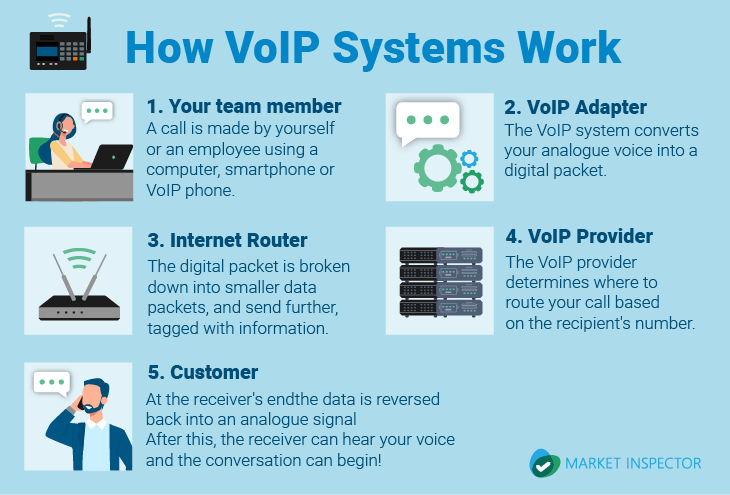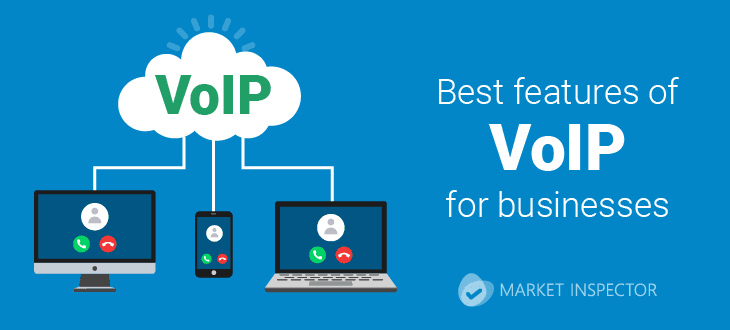Answer these simple questions and we will find you the BEST prices
Which type of solar quotes do you need?
It only takes 30 seconds
100% free with no obligation

Get up to 4 quotes from our selected suppliers by filling in only 1 form

Save money by comparing quotes and choosing the most competitive offer

Our service is 100% free and with no obligation
VoIP Meaning Explained: The 2024 Guide For Companies


- VoIP systems use internet access to make and receive calls, rather than traditional telephones, which use copper wires and cell towers.
- Companies can save between 30% and 50% on telecommunications costs when they choose a VoIP system.
- Businesses can achieve a return on investment between 9% and 27% with VoIP systems.
VoIP, known as Voice over Internet Protocol or Voice over IP, empowers businesses to connect with clients and suppliers without relying on traditional landline services. It has revolutionised business operations by offering a cost-effective and flexible alternative to traditional communications. Initially gaining traction around 1995, it soared in 2003. Since then, over 65% of start-up companies use VoIP, and almost one-third of companies utilise some form of VoIP service.
This comprehensive guide uncovers the core meaning of VoIP, its advantages, and why it's indispensable for modern enterprises.
From enhancing operational efficiency to providing a flexible and scalable communication infrastructure, VoIP is not just a technology but a strategic asset that aligns with the dynamic needs of today's corporate world.
Explore how VoIP can transform your business communications and give you a competitive edge in an increasingly interconnected global market.
- Describe your needs
- Get free quotes
- Choose the best offer
It only takes 30 seconds

What is VoIP?
VoIP systems use broadband/WIFI on computers, smartphones, VoIP phones, and WebRTC-enabled browsers to make phone calls and transfer data, unlike traditional landline communications, which transmit analogue signals via copper wires.
VoIP reduces landline costs and enables businesses to analyze call patterns and record calls for valuable data insights.
Your company can choose from four main types of VoIP configurations:
- Dedicated routers: These use a traditional phone that connects with cable or DSL modems to place VoIP calls.
- Adapters (USB): These are similar to dedicated routers in that they use traditional phones; however, they are connected with a USB adapter to place VoIP calls.
- Software-controlled VoIP applications: This software can be downloaded onto a computer or laptop and allows you to place VoIP calls directly from the device using a headset. It is one of the most popular forms of VoIP as it is low-cost and easy to install for employees.
- Dedicated VoIP: These phones that are similar to traditional wired or wireless telephones but connect directly to a computer.
Since 2020, many companies have opted for VoIP systems due to the rise in remote work. These services help companies connect globally with clients, suppliers, and team members while saving on long-distance bills. According to Tech.co, businesses can save up to 30 to 50% on communication costs by using VoIP, making it a cost-effective solution.
How does a VoIP phone system work?
A VoIP phone system enables you to make and receive calls online. This differs from traditional telephone communication systems, which transmit data via copper wires or cell towers. Below is a straightforward, step-by-step guide on how the process works:

- A call is made by yourself or an employee using a computer, smartphone or VoIP phone.
- Once you speak into the microphone, the VoIP system converts your analogue voice into a digital packet.
- The digital packet is broken down into smaller data packets, which are then sent over the Internet, much like files. Each packet is tagged with information about the sender and the recipient of the data.
- The data then travels to the VoIP provider's servers using internet waves.
- The VoIP provider acts as a switchboard, determining where to route your call based on the recipient's number.
- At the receiver's end, whether using a VoIP system or a traditional phone, the data is reversed back into an analogue signal using a digital-to-analogue converter (DAC).
- After this, the receiver can hear your voice and the conversation can begin!
With a stable internet connection, you and your business can connect to anyone in the world in seconds, which can decrease telecommunication costs by 50%. Additionally, it provides easier access to conference calls and video calls than traditional landlines.
With a fast connection and streamlined service, VoIP can increase employee productivity by 67%, according to Learn.G2, and customer satisfaction with better voice quality and easier connection to your company.
However, for VoIP systems to work effectively, you and your business must have a steady internet connection. A poor connection can result in delays and noise distortion. Additionally, if the internet goes down, so too does your phone connection.
Why did VoIP phones rise in popularity?

As of 2020, VoIP phones have risen in popularity as many businesses were forced to adopt a remote work module due to the pandemic. By 2026, according to JustCall, the VoIP market is expected to reach $106 billion.
The popularity of VoIP systems has stemmed from more than just the demand for remote work. Companies are adopting these systems because they are more cost-effective than traditional landline services. Adding phone lines can be expensive and challenging to install as companies grow. However, VoIP systems integrate with emails and instant messaging, enhancing productivity and collaboration across your business.
Customer service improves significantly with VoIP. When companies utilise a cloud contact service, they can access various functional, operational, and financial benefits unavailable with location-based services.
According to Teletech, using VoIP services can lead to an 8% to 22% improvement in first-contact resolution rates, directly impacting customer and employee satisfaction. Companies can achieve a return on investment (ROI) of between 9 to 27% by using VoIP systems for several reasons.
- Reducing staffing costs as there are less workforce required to handle troubleshooting, phone maintenance and administration tasks.
- Increased productivity as it reduces time spent managing traditional phone lines, voicemails and call routing.
- Enhancing collaboration as it reduces the need for in person meetings through features like video conferencing, instant messaging, and virtual collaboration tools.
- Increased customer satisfaction due to faster connection times and efficient query resolution.
- Reducing downtime by minimising phone system issues.
As a result VoIP phones have become popular due to their cost efficiency, flexibility, integration capabilities, global and remote work support as well as its reliability. These factors combine to make VoIP a compelling choice for businesses.
Best VoIP providers in 2024
In 2024, the top VoIP providers are distinguished by their comprehensive feature sets, reliability, and affordability, catering to individual and business needs.
Below, we have listed the best VoIP providers currently in the UK market. We have highlighted some of the most valuable and useful features and packages.
- Vonage: The Vonage VoIP system offers advanced features, including high-definition voice calls, video conferencing, call routing, and integration with popular business tools like CRM systems and Microsoft Teams. It provides scalability for businesses to add or remove users as needed, and its mobile app enables seamless communication on the go. Vonage offers competitive pricing and comprehensive customer support, making it a reliable and flexible VoIP solution that enhances productivity and communication efficiency.
- 3CX: The 3CX VoIP system offers an array of features to maximise efficiency, streamline operations, and provide a high level of performance. It is well known for the clarity of their calls and easy installation process which can be set up by your own tech team in a matter of days.
- BT: The BT VoIP system provides a reliable and robust VoIP solution that seamlessly integrates with business telecommunication needs. BT offers a cloud-based phone system with flexible, agile, powerful call management features and personalised guidance to help you make the best choice.
- Ring Central: RingCentral is a popular choice for businesses. It provides comprehensive, unified communication tools for voice, video, and messaging, making it a great all-in-one solution. It seamlessly integrates with CRM platforms like Salesforce, HubSpot, Pipedrive, and Zoho.
- 8x8: 8x8 is well-known for its global presence and robust security features, which cater to enterprises with international operations and strict compliance requirements. It offers numerous advantageous features that can scale with a company as it grows. Additionally, it enables users to make international calls, making it an ideal choice for global companies.
These providers are highly regarded for innovative features, customer support, and cost-effective plans, making them top choices in the UK.
Business VoIP: best features and services

Business VoIP services are revolutionising corporate communication with advanced features and services designed to enhance productivity and collaboration. Critical features for business VoIP include:
- Advanced call management allows you to prioritise calls to maintain call quality. According to Voicespin, this can reduce callers' wait times, eliminate call transfers, improve your first call resolution, average handle time and also improve the experience for your agents.
- CRM integration allows you to enable seamless data sharing and enhance customer service. Security features like end-to-end encryption and secure data storage safeguard sensitive communications and data.
- Mobility and remote access allow employees to make and receive calls using their smartphones, tablets, and laptops, which provides the business with flexibility to allow them to work from anywhere.
- Scalability and flexibility allow you to remove or add users without extensive infrastructure changes by providing a centralised platform to manage users, features, and settings remotely, simplifying administration.
- Call analytics allows you to track incoming and outgoing call data to better measure performance and customer experience.
These features and services make Business VoIP an attractive option for companies looking to enhance their communication capabilities, support remote work, and reduce costs.
Setting up a VoIP phone system for small business
Setting up a VoIP phone system for a small business involves several key steps to ensure a smooth transition and effective communication capabilities. Here’s a comprehensive guide to help you set up a VoIP phone system for your small business:

- Determine requirements: Identify the number of users, the types of calls you handle (local, international), and the features you need (voicemail, call forwarding, conferencing).

- Budget planning: Establish a budget for initial setup and ongoing costs, including hardware, software, and subscription fees.

- Test your internet connection: Ensure you have a reliable, high-speed internet connection. VoIP quality depends on sufficient bandwidth and low latency.
- Choose a VoIP provider: Look for providers that offer packages tailored to small businesses. Consider factors like pricing, customer support, and features.

- Select VoIP equipment: Choose VoIP phones, adapters, or headsets that suit your needs and company requirements.

- Configure your VoIP system: Create an account with your VoIP provider and obtain login credentials. Follow the provider's instructions to configure VoIP phones or softphones, which usually involves entering SIP credentials or automatic provisioning. Download and install any required software provided by your VoIP provider, such as softphones or mobile apps.

- Test your system: Make test calls to ensure clear audio quality and no significant delays or interruptions. Verify that all features, such as voicemail, call forwarding, and conferencing, are working correctly. Simulate heavy usage to ensure your network can handle peak call volumes without affecting call quality.

- Train your team: Educate your staff on using the new system, including making and receiving calls, transferring calls, and using voicemail.
By following these steps, you can set up a VoIP phone system that meets the needs of your small business, providing reliable and cost-effective communication. This setup will enhance your business's communication efficiency, support growth, and improve overall customer satisfaction.
Mobile VoIP
Using VoIP on mobile phones provides businesses with great flexibility and cost savings. This technology allows employees to make and receive online calls instead of traditional phone lines.
By installing a specific application on a mobile phone, you and your business can use the Internet to make calls. VoIP apps can be integrated with business phone systems, enabling mobile phones to function as extensions of the office phone system. This means that employees can be reached on their business numbers no matter where they are.
Mobile VoIP comes in various forms. While WhatsApp is the most popular and commonly used VoIP app, other providers like RingCentral or Microsoft Teams offer more personalised and professional services for mobile devices.
You only need a working smartphone with a stable internet connection to use mobile VoIP. For optimal performance, using the latest smartphone models with robust processing capabilities and sufficient memory (at least 2GB of RAM) is recommended. Using a headset when using VoIP phones to reduce background noise is also advisable.
How much do VoIP solutions cost?

The cost of VoIP solutions in the UK can vary significantly depending on the provider, required features, number of users, and type of plan chosen.
According to Startups, an average VoIP solution can cost between £5 and £50 per month. However, this depends on factors such as the number of users, required features, the type of plan chosen, whether basic or premium and the provider selected for the VoIP system.
In addition to the VoIP service, additional costs include paying for an internet provider. Choosing a reliable provider with a strong internet connection is crucial for the VoIP system to function effectively. On average, the cost of a broadband provider can range between £15 to £50 per month.
Furthermore, if you opt for VoIP phones and headsets for your business, there will be additional costs. The price of these items can range from £20 to £300, depending on whether you choose a basic or premium model.
These are the main factors that will impact the overall cost of implementing a VoIP phone system in your business.
When choosing a VoIP solution, comparing providers based on the features you need, the number of users, and any additional costs such as setup fees or international call rates is essential. This ensures you find the most cost-effective solution that meets your business requirements.
Is a VoIP system worth it?
Investing in a VoIP system is highly beneficial for businesses of all sizes due to its cost-effectiveness, flexibility, and advanced features.
Unlike traditional phone systems, VoIP uses the internet to transmit calls, significantly reducing costs for both local and international communication. This is particularly advantageous for businesses with global clients or remote employees, as it eliminates expensive long-distance charges and allows seamless integration across different locations. Additionally, VoIP systems offer various advanced functionalities such as call forwarding, voicemail-to-email, video conferencing, and mobile integration, enhancing overall communication efficiency and productivity.
The scalability of VoIP also means that businesses can easily add or remove users without the need for extensive infrastructure changes, making it a flexible and future-proof choice. Moreover, with the trend towards remote and hybrid work environments, VoIP provides the necessary tools for maintaining robust and reliable communication, ensuring that the investment in a VoIP system is well worth it.
You can receive expert advice tailored to your business needs by completing our free quote form. Our team will provide you with up to four customised quotes, ensuring you find the best solution. This service is entirely free and carries no obligation.
- Describe your needs
- Get free quotes
- Choose the best offer
It only takes 30 seconds

FAQ
VoIP is used for making voice calls over the internet, enabling cost-effective communication with features like call forwarding, voicemail, and conferencing for both personal and business use.
VoIP is a technology for making voice calls over the internet, while WiFi is a wireless technology that provides internet access. VoIP can operate over WiFi networks to facilitate communication
People would use a VoIP phone for cost-effective, flexible communication with advanced features like call forwarding, conferencing, and remote access over the internet.
Yes, WhatsApp calls are VoIP as they use the internet to transmit voice data instead of traditional phone lines.

Caoimhe is an experienced content writer and researcher who is passionate about providing accessible information to every reader. With a background in English literature and Sociology, she combines the two disciplines to create cohesive, well-thought-out, and well-informed pieces.
We strive to connect our customers with the right product and supplier. Would you like to be part of Market Inspector?

